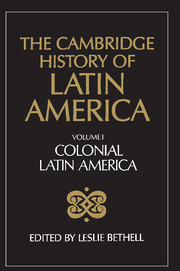Book contents
- Frontmatter
- PART ONE AMERICA ON THE EVE OF THE CONQUEST
- PART TWO EUROPE AND AMERICA
- 6 The Spanish Conquest and settlement of America
- 7 The Indian and the Spanish Conquest
- 8 The Portuguese settlement of Brazil, 1500–80
- 9 Spain and America in the sixteenth and seventeenth centuries
- 10 Spain and America: the Atlantic trade, 1492–1720
- 11 Bourbon Spain and its American empire
- 12 Portugal and Brazil: political and economic structures of empire, 1580–1750
- 13 Portugal and Brazil: imperial re-organization, 1750–1808
- PART THREE THE CHURCH IN AMERICA
- Bibliographical essays
- Indians of the Caribbean and Circum-Caribbean at the end of the fifteenth century
- The discovery and exploration of the New World
- References
10 - Spain and America: the Atlantic trade, 1492–1720
from PART TWO - EUROPE AND AMERICA
Published online by Cambridge University Press: 28 March 2008
- Frontmatter
- PART ONE AMERICA ON THE EVE OF THE CONQUEST
- PART TWO EUROPE AND AMERICA
- 6 The Spanish Conquest and settlement of America
- 7 The Indian and the Spanish Conquest
- 8 The Portuguese settlement of Brazil, 1500–80
- 9 Spain and America in the sixteenth and seventeenth centuries
- 10 Spain and America: the Atlantic trade, 1492–1720
- 11 Bourbon Spain and its American empire
- 12 Portugal and Brazil: political and economic structures of empire, 1580–1750
- 13 Portugal and Brazil: imperial re-organization, 1750–1808
- PART THREE THE CHURCH IN AMERICA
- Bibliographical essays
- Indians of the Caribbean and Circum-Caribbean at the end of the fifteenth century
- The discovery and exploration of the New World
- References
Summary
Spain and its American empire, Old World and New, were linked by the Atlantic Ocean. Wooden sailing ships, tiny by modern standards, lumbered to America and back year after year for more than three centuries along routes of impressive consistency and regularity. These ships, the ports from and to which they sailed, the courses and time they took, and the people who worked or bought passage on them form a fascinating chapter in the history of the sea. The carrera de Indias, as the Spanish-American sea link was often called, and the trade which it carried, was also, of course, an economic and, ultimately, a social and cultural factor of great importance. The fleets brought to Europe maize, potatoes, sugar, tobacco, as well as gold and silver. In return Europe sent, as well as people and manufactured goods, wheat, pigs, sheep and cattle which had sweeping effects on American diets and landscapes. It is this Atlantic trade during the sixteenth and seventeenth centuries that will be explored in the following pages. The carrera itself went through a series of cycles, short and long, which both reflected and affected socio-economic conditions in the mother country and the colonies. Moreover, as European imperial rivalries increased, especially in the Caribbean, the carrera was threatened, directly by pirates and privateers and indirectly by the efforts of northern European smugglers to replace it as supplier to and buyer from the Spanish-American empire.
- Type
- Chapter
- Information
- The Cambridge History of Latin America , pp. 341 - 388Publisher: Cambridge University PressPrint publication year: 1984
References
- 6
- Cited by



